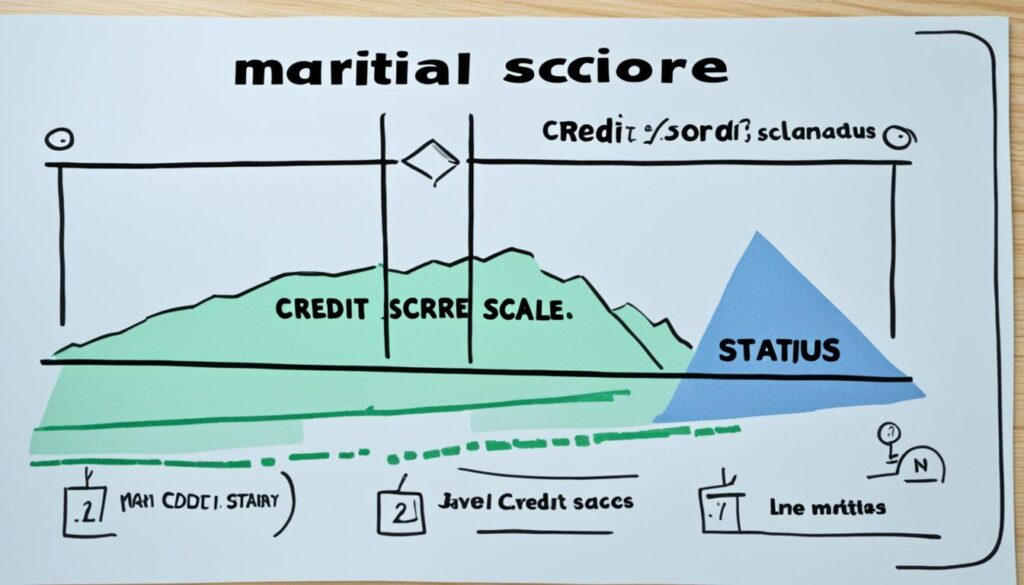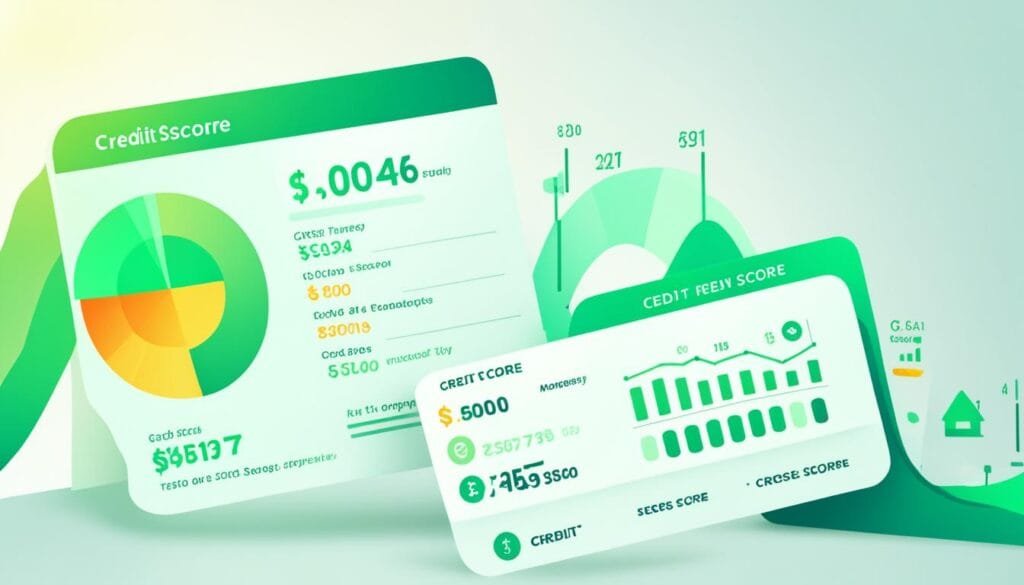Divorce can have a significant impact on your credit score, so it’s important to understand how to protect your credit during the process. According to a survey, 38% of respondents saw their credit score drop by more than 50 points after separating from their partner. To safeguard your financial future, follow these four steps recommended by experts.
Key Takeaways:
- Divorce can negatively impact your credit score.
- Pulling your credit report and reviewing linked accounts is essential.
- Separate joint accounts quickly to avoid shared liability.
- Contact creditors to update your marital status.
- Consider freezing your credit to protect against identity theft.
Step 1: Pull your credit report and review linked accounts
Starting the process of protecting your credit post-split begins with pulling your credit report from all three credit bureaus. This will give you a comprehensive overview of your credit profile and highlight any accounts that are linked to your name.
Take note of any joint accounts that you and your spouse share liability for. These joint accounts can have a significant impact on your credit, as missed or late payments can affect both parties. If there are any credit card accounts where your spouse is listed as an authorized user, it’s important to be aware of the potential impact their payment activity may have on your credit report.
To avoid any potential negative effects, consider removing yourself as an authorized user from your spouse’s credit cards. This will help ensure that their payment activity does not impact your credit standing.
Better Understand Your Credit Profile
“Reviewing your credit report is crucial after a divorce. It allows you to assess your financial situation and identify any joint accounts. This knowledge will help you make informed decisions about how to manage your credit moving forward.”
By pulling your credit report and reviewing your linked accounts, you gain a clearer understanding of the financial associations tied to your credit profile. This knowledge empowers you to take the necessary steps to protect your credit and financial well-being in the aftermath of a divorce.
To visualize how the process works, here is an example of a divorcee’s credit report:
| Account | Account Type | Linked To |
|---|---|---|
| Chase Credit Card | Credit Card Account | Joint Account |
| Mortgage Bank of America | Loan Account | Individual Account |
| Discover Card | Credit Card Account | Authorized User (Spouse) |
As shown in the table, the divorcee has identified a joint credit card account with Chase Bank, an individual mortgage account with Bank of America, and a credit card account with Discover where their ex-spouse is listed as an authorized user.
Having a visual representation of your linked accounts can help you determine the best approach to untangling your finances and safeguarding your credit.
In Summary
- Pull your credit report from all three credit bureaus
- Identify joint accounts that may impact your credit
- Take note of any credit card accounts where your spouse is listed as an authorized user
- Consider removing yourself as an authorized user from your spouse’s cards
By following these steps and staying informed about your credit profile, you can take proactive measures to protect your credit during and after a divorce.
Step 2: Separate accounts as quickly as possible
Once you have reviewed your linked accounts, the next crucial step is to separate your accounts as soon as possible. Joint account holders are both responsible for any missed or late payments. Therefore, closing joint accounts instead of dividing responsibility is highly recommended to protect your credit.
If you have any personal credit cards, it’s important to ensure that they are in your name only. This will help to establish and maintain your own personal credit history moving forward.
Before closing any joint accounts, be sure to redeem any rewards that have been earned on those cards. Contact the credit card issuer to inquire about the process for redeeming rewards.
Additionally, it’s essential to monitor the activity on joint accounts while both parties still have access. This will help you catch any unauthorized charges and cancel any recurring charges before closing the account.
To give you a better understanding, here is a visual representation of the steps you should take to separate your accounts:

| Steps | Description |
|---|---|
| Step 1 | Pull your credit report |
| Step 2 | Review linked accounts |
| Step 3 | Separate joint accounts |
| Step 4 | Redeem rewards on joint cards |
| Step 5 | Monitor account activity |
| Step 6 | Close joint accounts |
By following these steps, you can ensure that your accounts are separated effectively and minimize the risk of any negative impact on your credit.
Step 3: Contact creditors to update marital status
During a divorce, it is crucial to update your marital status with your credit card issuers and lenders. This helps ensure that your credit accounts accurately reflect your current situation and reduces potential complications down the line.
When contacting your creditors, provide them with any necessary documentation, such as your divorce decree or legal separation agreement, to support your request. Here are some important actions to take:
- Notify Credit Card Issuers and Lenders: Call or send a written notice to inform your creditors about your change in marital status. Be prepared to provide details about your joint accounts and any outstanding balances.
- Discuss Joint Credit Card Balances: If you have joint credit card debt with your ex-spouse, it’s essential to discuss the best way to handle it. Explore options such as negotiating a payment plan or refinancing the debt onto individual accounts.
- Secure Agreements in Writing: Whatever agreements you reach with your creditors, it is essential to get them in writing. This protects your rights and ensures clarity regarding your obligations.
- Consider Balance Transfers: If necessary, you may want to transfer the joint credit card balance to an individual credit card with a balance transfer offer. This can help you avoid accruing additional interest on the debt.
By contacting your creditors and taking proactive steps to address your credit during a divorce, you can protect your financial well-being and maintain control over your individual credit accounts.

How Can I Protect My Credit Score During a Divorce?
During a divorce, it’s crucial to protect your credit score. Avoid opening joint credit accounts and consider freezing your credit. Communicate with your ex about financial responsibilities and keep paying joint bills on time. Follow these joint credit application tips approved to maintain your credit score during this challenging time.
Step 4: Consider freezing your credit
If you are concerned about financial abuse or the possibility of unauthorized accounts being opened in your name, it’s important to take steps to protect yourself. One effective measure you can consider is freezing your credit. By freezing your credit, you prevent anyone, including yourself, from opening new lines of credit without your consent.
Freezing your credit is a precautionary measure that can safeguard you against identity theft. With a frozen credit, lenders and creditors will be unable to access your credit report, making it significantly more challenging for fraudsters to open accounts in your name. However, it’s important to remember that you can temporarily lift the freeze when necessary, such as when you need to apply for new credit.
To freeze your credit, you’ll need to contact each of the three credit bureaus – Equifax, Experian, and TransUnion. They will guide you through the process and provide you with a unique PIN or password to use when you want to unfreeze your credit. It’s crucial to keep this information safe and secure.
By freezing your credit, you are taking a proactive step to protect yourself from potential harm. Whether you are concerned about your ex-spouse’s financial abuse or you want to safeguard your identity from potential thieves, freezing your credit can provide you with peace of mind.
FAQ
How does divorce affect my credit?
Divorce can have a significant impact on your credit score. According to a survey, 38% of respondents saw their credit score drop by more than 50 points after separating from their partner.
How can I protect my credit during a divorce?
To safeguard your financial future, follow these four steps recommended by experts: pull your credit report and review linked accounts, separate accounts as quickly as possible, contact creditors to update your marital status, and consider freezing your credit.
What should I do first to protect my credit during a divorce?
Start by pulling your credit report from all three credit bureaus to identify which accounts are linked to your credit profile. Take note of any joint accounts that you share liability for and any credit card accounts where your spouse is listed as an authorized user.
Should I remove myself as an authorized user from my spouse’s credit cards?
Yes, consider removing yourself as an authorized user from your spouse’s cards to prevent their payment activity from affecting your credit report. This step can help protect your credit during the divorce process.
What should I do with joint accounts during a divorce?
It’s crucial to separate your accounts as soon as possible. Joint account holders are both responsible for any missed or late payments, so closing joint accounts rather than dividing responsibility is recommended. Be sure to redeem any rewards earned on joint cards before closing them.
How can I monitor joint accounts during a divorce?
Monitor the activity on joint accounts while both parties still have access to catch any unauthorized charges and cancel any recurring charges before closing the account. This proactive approach can help protect your credit during the divorce process.
What should I do with outstanding balances on joint credit cards?
Contact your credit card issuers and lenders to inform them of the change in your marital status. If there is an outstanding balance on a joint credit card, discuss options with your creditor, such as a payment plan or refinancing the debt onto an individual account. Get any agreements in writing.
Can I transfer joint debt to an individual credit card?
Yes, if needed, consider transferring the joint debt to an individual credit card with a balance transfer offer. This can help you avoid accruing interest on the joint debt during the divorce process. However, it’s essential to carefully evaluate the terms and conditions before making this decision.
Should I freeze my credit during a divorce?
In extreme cases where you are concerned about financial abuse or unauthorized accounts being opened in your name, consider freezing your credit. Freezing your credit prevents anyone, including yourself, from opening new lines of credit without your consent. Keep in mind that you can thaw your credit temporarily when applying for new credit.
How can freezing my credit protect me during a divorce?
Freezing your credit is a precautionary measure to protect yourself against identity theft and unauthorized accounts being opened in your name. By freezing your credit, you mitigate the risk of your ex-spouse potentially damaging your credit during or after the divorce process.

